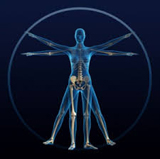The body
The spontaneous action of the body*
Even in the body, for instance, when there is something like an attack, an accident, an illness trying to come in — something — an attack on the body, a body that is left to its natural spontaneity has an urge, an aspiration, a spontaneous will to call for help. But as soon as the affair goes to the head, it takes the form of things to which one is accustomed: everything is spoilt. But if the body is seen in itself, just as it is, there is something which suddenly wakes up and calls for help, and with such a faith, such an intensity, just as the tiny little baby calls its mamma, you know — or whoever is there, it says nothing if it cannot speak. But the body left to itself without this kind of constant action of the mind upon it... well, it has this: as soon as there is some disturbance, immediately it has an aspiration, a call, an effort to seek help, and this is very powerful. If nothing intervenes, it is very powerful. It is as though the cells themselves sprang up in an aspiration, a call.
In the body there are invaluable and unknown treasures. In all its cells, there is an intensity of life, of aspiration, of the will to progress which one does not usually even realise. The body-consciousness would have to be completely warped by the action of the mind and vital for it not to have an immediate will to reestablish the equilibrium. When this will is not there, it means that the entire body-consciousness has been spoilt by the intervention of the mind and vital. In people who cherish their malady more or less subconsciously with a sort of morbidity under the pretext that it makes them interesting, it is not their body at all — poor body! — it is something they have imposed upon it with a mental or vital perversion. The body, if left to itself, is remarkable, for, not only does it aspire for equilibrium and well-being but it is capable of restoring the balance. If one leaves one’s body alone without intervening with all those thoughts, all the vital reactions, all the depressions, and also all the so-called knowledge and mental constructions and fears — if one leaves the body to itself, spontaneously it will do what is necessary to set itself right again.
The body in its natural state likes equilibrium, likes harmony; it is the other parts of the being which spoil everything.
Mother, how can one prevent the mind from intervening?
Ah! First you must will it, and then you must say, as to people who make a lot of noise, “Keep quiet, be quiet, be quiet!”; you must do this when the mind comes along with all its suggestions and all its movements. You must tranquillise it, pacify it, make it silent. The first thing is not to listen to it. Most of the time, as soon as all these come, all these thoughts, one looks, seeks to understand, one listens; then naturally that imbecile believes that you are very much interested: it increases its activity. You must not listen, must not pay attention. If it makes too much noise, you must tell it: “Be still! Now then, silence, keep quiet!” without making a lot of noise yourself, you understand? You must not imitate those people who begin shouting: “Keep quiet”, and make such a noise themselves that they are even noisier than the others!
* Heading provided by the Editor.
*The Mother. Collected Works of the Mother, Volume 6. Cent ed. Pondicherry: Sri Aurobindo Ashram Trust; 1979, pp. 139-41.
Share with us (Comments,contributions,opinions)
When reproducing this feature, please credit NAMAH,and give the byline. Please send us cuttings.


